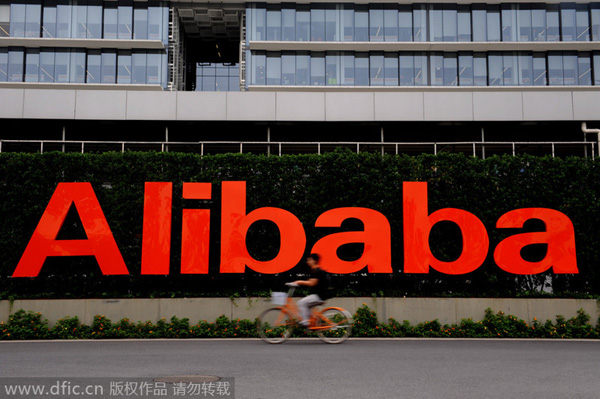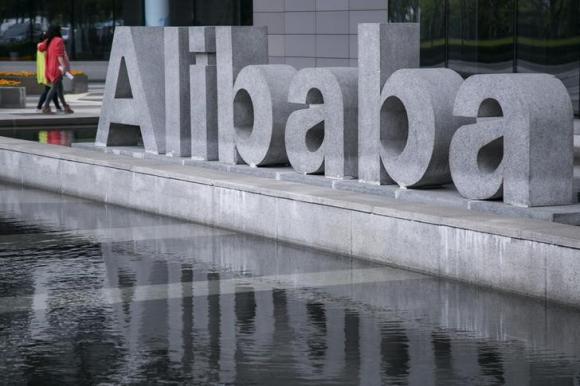
A cyclist rides past a signboard of Alibaba Group in Hangzhou city, East China's Zhejiang province, June 25, 2014.
As Alibaba's record-breaking IPO grabbed the world's attention last month, Western media raced to spotlight the creative, irreverent – even cool and possibly cultish - atmosphere that spawned China's e-commerce juggernaut.
Behind-the-scenes, according to exclusive interviews, a different scene emerges. As a range of Alibaba's past and current employees told chinadaily.com.cn, the truth is more complicated, but just as interesting.
It's true the company's core values are named after a martial arts technique, the Six Vein Spirit Sword, from one of founder Jack Ma's favorite kung fu novels.
Also confirmed is that the former English teacher Ma sent an internal message last October encouraging employees to "invade Antarctica" and "kill penguins" in Alibaba's duel with rival Tencent, whose mascot is a penguin.
It has also been reported that Ma practiced tai chi at economic forum and has let loose at company's annual event – for its 10-year anniversary celebration he was a silver-hair punk rocker, singing a song from the lion King, and, another year he was blonde Snow White in a puffy dress.
Much circulated stories such as these have deflated Western stereotypes of Chinese companies as tradition dominated, dull and fixated on the bottom line. The Alibaba narrative reads more like your typical Silicon Valley start-up than Sinopec, China's state-run oil company.
In truth, working at Alibaba also has its share of stress and shouting matches, according to past and current employees, and intense pressure comes in equal parts with camaraderie and success.
"Arguing represents a serious work attitude, and overtime isn't overtime in Alibaba, meaning you have to finish your project on schedule," said li Zhiguo, who worked at Alibaba for nine years before becoming CEO of Wacai, a startup online platform for personal finance.
A current Alibaba employee who requested anonymity said: "I've seen colleagues quit because they couldn't come up with the breakthroughs on projects as they confidently said they could. It's common."
The employee, an ex-technology reporter, was quick to point out that the pressure to perform comes mostly from employees' dedication and an eagerness to impress their 49-year-old founder Ma.
"It's because of one's sense of honor," said he.
Disputes and overtime
As in any high-pressure work environment, tempers at Alibaba sometimes boil over.
"Harmonious meetings would be a disaster to any Internet company in China. But what's rare about Alibaba is that disagreements were only about work issues, no one is targeted personally," said li Zhiguo, adding that he's been fostering a similar atmosphere in his startup.
"Quarrelling is a must. It means employees want to excel from the bottom of their heart," he added

People walk at the headquarters of Alibaba in Hangzhou, Zhejiang province, April 23, 2014.
Zhang Lei, an Alibaba spokesperson on corporate culture, said the company has its own words for the shouting matches, referring to them as "critical execution." The spokesperson said obeying orders is less appreciated than inspiration and this attitude is expected from all Alibaba employees.
Working overtime, as in most Chinese companies, is very common, several Alibaba employees told China Daily Online.
"The job is more tiring than my last one, but it's more creative and interesting," said a current Alibaba employee who declined to give his name for fear of disrupting his workplace.
"There are no clear off hours," said the source who is a former investment banker.
li Zhiguo admitted the Alibaba culture is such that most employees rarely think about working excessive hours.
"Alibaba used to have a punch machine [time clock] a long time ago but later revoked it to give employees more freedom," said li.
The corporate structure is project-oriented, sources said, with human resources deployed for a specific project and reassigned when it's over.
"With the Internet industry in China changing so fast, you constantly feel the pressure to not fall behind," said the ex-reporter, adding "You have to run fast and also in the right direction."
This ability to be both aggressive and accurate has been an Alibaba trademark, said the former banker.
"Embracing change is true with our peers, too. Only Baidu and Tencent are more like foreign companies than Alibaba. We play less by the rules and add more of a human touch," the source said.
"We are a bunch of young people who aren't in it for the money."
Zhang Yichi, a professor at Guanghua School of Management of Peking University, said this inspiration comes straight from the top.
"The success of Alibaba is in part because Jack Ma is a master at appealing to the noble call in an employee's heart to help small companies by making their sales more convenient," said Zhang, who has studied the Alibaba model.
But li argues that the evolution is inevitable in an industry that is increasingly global and interconnected.
"Chinese Internet companies are hard-working and have great potential. The gap between China and the US in the development of the Internet industry is getting smaller and smaller," said li.
The cult of Ma?
In a now-famous quote to his 17 co-founders in the East China apartment complex that was the birthplace of Alibaba, Ma compared his team to Silicon Valley by saying, "Our brains are just as good as theirs.

A Chinese employee enters the headquarters of Alibaba Group in Hangzhou city, East China's Zhejiang province, 25 June, 2014.
More recently, in a letter to investors, Ma replaced his dream with a bigger one: "In the past decade, we measured ourselves by how much we changed China. In the future, we will be judged by how much progress we bring to the world."
This brand of entrepreneurial confidence has won Ma plenty of followers across the tech industry and beyond. All employees who spoke to China Daily Online pointed to him as the underpinning of all institutional attitudes.
"Jack Ma may have boasted about Alibaba in the beginning like other Internet tycoons do in China, but he is rare because most of his bragging has come true. Many of my colleagues even idolize him," said the former reporter.
Ma's personality is ever present as all employees have nicknames, most of which are inspired by Ma's beloved kung fu novels.
"'Not for petty profits but for the common good' was the motto ancient Chinese swordsmen lived by. Jack Ma has succeeded in appealing to such a call, one that had been long forgotten in the wake of the widened social and economic gap," said Zhang.
The professor continued: "The role of Jack Ma is to point direction, cheer up employees and enhance their sense of mission. When I have talked to Alibaba employees, I found they are so self-motivated that the company is always on their mind."
Even so, interviewees who spoke to China Daily Online dismissed the outside perception that Alibaba is like a cult and Ma its leader.
"That word is too extreme. I see it more of like being able to be your true self and being loyal to friends, just like swordsmen from ancient times," said the former reporter.
Zhang said the word "cult" is used by "jealous peers who find it hard to explain and difficult to imitate."
"Corporate culture is supposed to be different from social culture. Alibaba is more like a tribe or clan to me because its employees trust and help one other and communicate without office politics in a straight forward way."
The former employee li agreed and said the Alibaba atmosphere extends outside its offices.
"Ex-employees who have left Alibaba to start their own business are very willing to help each other. It makes me a confident entrepreneur and there's much successful experience to draw from Alibaba," he said.
Perks and post-IPO
As Andrew Teoh, a former Alibaba executive and founder, told the Reuters news agency, "Alibaba is not like a Chinese company, it's a blend of the good parts of East and West."
If this is true, the evidence could be in some of Alibaba's very Asian corporate traditions.
For example, mass weddings have become an annual affair among the company's roughly 22,000 employees. This year, 102 couples received blessings from Ma and tied the knot at the company's compound in an ancient-style ritual.

